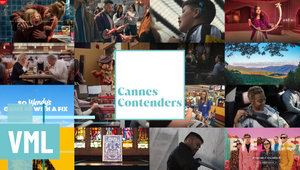
Why This Creative Team Is Banishing Bossy, Bubbly Bitches on IWD

Women aren’t tough, they’re ‘bitches’. Women aren’t leaders, they’re ‘bossy’. They’re not assertive, they’re ‘aggressive’. They’re not passionate, they’re ‘emotional’. They’re not funny, they’re ‘feisty’. The way we use language subtly undermines women in thousands of ways – it may not be the most dramatic or shocking form of discrimination, but it reinforces the stereotypes that hold women back.
That’s why creative team Bethany Jones and Ed Tuddenham, who currently work at J. Walter Thompson London, decided that this IWD they wanted to build a better vocabulary to help elevate and celebrate women. WMNS Wordhoard is a collaborative project that they hope will mend the damage of misogynistic words and concepts. They’ll be replacing negative words with more positive new inventions. The project has launched as a word-a-day style website and a Twitter feed – and the pair are keen for potential collaborators to submit their own ideas too.
LBB caught up with Bethany and Ed to find out where the idea came from.
LBB> What was the original spark for this idea? Was there one word in particular that made you think?
Bethany> Yep. Ditzy. Like, why is it such a bad thing to enjoy the shallow things in life, light topics, pop culture, Kardashians? I’m not an idiot just because I don’t want to chat about Sartre 24/7. The whole value of high/low culture need to be reconsidered.

LBB> I'm curious about the conversations from which the project emerged - is it something you have been thinking about or talking about for a long time or was there more of a light bulb moment?
Bethany> We were thinking about IWD and what we would want to receive as a festive gift. I mean Valentine’s Day gives you some excellent rom coms and memes... so what would you want to wake up to on IWD?
And I suppose the answer was I want to do traditionally ‘feminine things’ and feel no shame in doing them, and for men to go, ‘yeah I can be those things too, because it’s not good or bad it just is’.
LBB> Why create new words rather than trying to reclaim the misogynistic ones and change their meaning?
Bethany> Because there will always be a sort of shadow that hangs over that word. Many people will instinctively remember what that word used to mean. Even if they’re intentionally trying to use it positively.

LBB> How are you creating the new words?
Bethany> Finding the most frustrating words. Then it was basically imagining someone calling my friends, my mother, people I admire on Instagram and also being called those words myself, then thinking about how we would take it. What aspect of it do we let provoke and motivate us? What about that moves us forward? Then combining those feelings. Then putting them in a nice, digestible word-a-day format.
LBB> The project really dives into linguistics and etymology - how did it make you think about words differently?
Bethany> When we look back at etymology of words, we can make things more universal. Almost like going back to proto-Indo-European, making the world and language smaller and more connected. It’s important in a world where we’re being told we’re all so very different from each other.

LBB> How did you go about sounding out which ones 'worked' and which ones felt 'awkward'?
Bethany> Well there was a time where one word was dangerously close to faecal and Ed was like, ‘yeah… nah that’s not it’.
LBB> How can people engage with this and help the cause?
Bethany> By telling us what words they hate and telling us words they’ve made up. Telling us how they feel misrepresented by language, telling us the words we’ve made are shit and totally don’t represent them, telling us how they can be better, work harder.

LBB> What are your hopes for how the new words will get adopted?
Bethany> Adopting the language wasn’t the main priority. Highlighting how people still use these pejoratively gendered words was.
LBB> How long do you expect the idea to run for?
Bethany> I will be personally using the word ‘bungot’ for the rest of my life. You’ll have to keep an eye on the twitter to find out what it means.
LBB> Of the words you've created, which is your favourite and why?
Bethany> Racoralious, its an adjective to describe people who continually muster every inch of their being to achieve their goals.
The etymology of it, Re- coming from French, ‘again’; cor is Latin for ‘heart’; alier is from the French, ‘unite’. So ‘unite your heart again’, is a lot more like how ambitious feels, than the etymology of ambitious – soliciting votes for the Greek senate.

LBB> The project challenges the often unthinking way we use language that is gendered and can undermine women - which such words wind you up most personally and why? And are there any you have found yourself using in the past?
Bethany> I get called aggressive a lot when I’m just passionate about something. Which is frustrating because people turn your very valid argument into an emotional overreaction caused by your pink lady hormones.
I used to use bubbly in a sort of disdainful way. Gross by me, to be honest.















